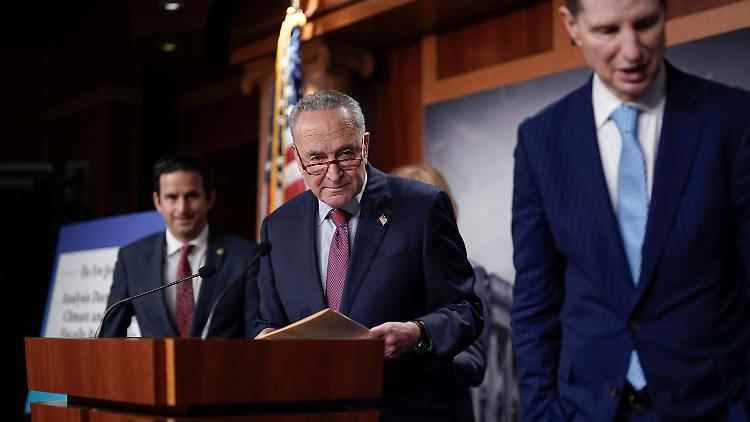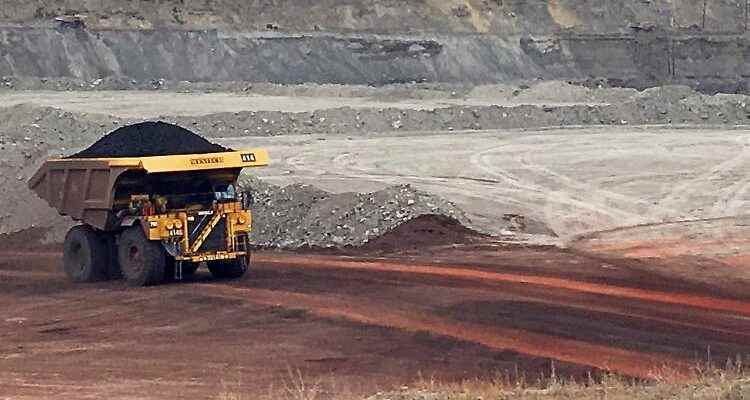Just a few weeks ago, US Democrats were assuming a presidency to forget and damn. But now Joe Biden is writing his way into the history books with a climate law package. It is the joyful finale to a media saga that has lasted for more than a year.
It went extremely fast. Within two weeks, almost out of nowhere, the US Congress passed a climate package worth 369 billion dollars for the next ten years in both chambers, which is to be counter-financed primarily with tax increases for corporations. It is the largest package of such measures ever adopted in the United States. It is also accompanied by financial relief for patients and great savings potential for the state budget. “Government work can be slow and frustrating, sometimes even desperate,” US President Joe Biden said after the announcement of the fundamental group-internal agreement: “But then the hard work of people who don’t want to give up pays off.”
Biden started with big promises. He wanted to make the health system cheaper, the economy future-proof, society fairer and also take the lead in global climate policy. In doing so, the democrat had raised immense hopes, despite his checkered political past. But drawn from the wisdom of age, he recognized the signs, it was said by the Democrats. Even the progressives and young voters, still mourning the loss of their candidate Bernie Sanders, rallied behind Biden. Maybe he is the dealmaker in your sense, who takes action if necessary? Some media even made prophetic comparisons to Franklin D. Roosevelt, the legendary champion of America’s first social programs.
A year and a half later, nobody goes that far anymore. It had taken just seven months after Biden took office for the flowers on the White House to wither. The president’s approval ratings fell below 50 percent for the first time – and have continued to do so ever since. Especially because there was no longer any talk of key projects such as universal health insurance or a higher national minimum wage. In the meantime, high inflation is also plaguing the population. The young voters had turned away, the left wing was annoyed, the Senate blocked for ambitious projects. Supposedly.
Climate sinner number 1
It sounded all too logical: the interests behind fossil fuels are gigantic, as are the corporate lobbying efforts in Washington. Almost 80 percent of US energy is powered by gas, oil and coal generated. The United States is the second largest air polluter after China. At the same time, among the major causes, they are by far the largest per capita emitter of the greenhouse gas carbon dioxide: 14 tons of CO₂ per year. In China it is 8.4 tons, in the EU 6 tons per inhabitant. But the heat waves, droughts and wildfires, melting polar ice caps, rising sea levels and tidal waves, none of this knows national borders. Domestic politics is more global than ever.
The climate part of the bundle entitled “Inflation Reduction Law 2022” is the most ambitious. It sets an initial impulse for the government to convert to renewable energies, with tax breaks for their use in industry, for more climate-friendly cars and other measures. Because of corporate taxes and savings in the health sector, the package should even save hundreds of billions of dollars in the state budget. According to estimates, up to 150 companies that have previously paid less or no taxes will have to pay 15 percent in taxes. Biden is also fulfilling the promise that the economy will no longer get away with it all. For Biden, it is a historic achievement and a giant leap forward, not just for the United States. Climate is global.
The world sorely needed such a surprise. General CO₂ emissions rose last year to their highest level since records began. Coal burning is responsible for 40 percent of the increase, never in human history has more of it been burned in a year. At the same time, however, it is already generating more energy from renewable sources than from fossil fuels. Wind and solar power increased, while hydroelectric power generation declined due to droughts, particularly in the United States and Brazil.
With Biden’s signature still pending, a media saga spanning over a year is nearing its finale. Good and evil were clearly defined in it. The good guys: the left, progressive wing of the Democrats who argued with bright young savages and for future generations. The chief villain was the thoroughly analyzed Senator Joe Manchin, who despite his party affiliation with his blockades defended the coal industry – and at the same time his donors – in West Virginia. The Republicans watched the butchering with amusement, while Biden seemed to be helpless. But about three weeks ago, there was movement in the intra-group negotiations, which were brought to a conclusion almost entirely under the media radar.
Not the best, but the possible
The package is not as comprehensive as progressive Democrats would have liked. The tax breaks for the super-rich and rich from Donald Trump’s presidency remain in place, and the senators made concessions to the fossil energy industry and manufacturers. State areas must be put out to exploit fossil fuels, such as in Alaska and the Gulf of Mexico.
However, the compromises are also about cushioning the consequences for the coal industry and its many employees. Among other things, they should be supported in finding work in the renewable energy sector without having to turn their lives upside down. Such concessions will come in handy for Biden and much of his party, especially so close to the congressional elections. The Democrats are repeatedly accused of no longer making policies for workers, but only for a detached urban elite.
The bottom line is that climate-friendly NGOs see the measures as extremely positive: According to them, emissions should be significantly reduced in the coming years. Various forecasts show according to the New York Times a reduction of around 40 percent by 2030 compared to 2006. This is still below the 50 percent target originally proclaimed by Biden. But this was the only way to convince the Democrat Joe Manchin, who was well paid by the coal industry, and then his colleague Kyrsten Sinema. In the Senate, where the wafer-thin majority depends on their votes, the only alternative would have been to finally bury the project.
Small legislative miracle

Senate faction leader Chuck Schumer negotiated the package with Joe Manchin and a small group of senators.
(Photo: AP)
In view of the resistance that has been overcome, the passage is a small legislative miracle. A great deal had indicated that Biden’s political capital was all but spent, more so than ever after November’s expected loss of the congressional majority. Because of power shifts in favor of the Republicans, it would probably have been many, many years before the next chance came up. Now Biden can thank Chuck Schumer, his parliamentary group leader in the Senate. He hammered the package with Manchin together in the back rooms of the Capitol within ten days. Even after it was passed in the Senate, the president’s poll numbers in the population rose significantly.
Some of Biden’s election promises are partially fulfilled: the taxation of corporations that sometimes paid nothing into the state coffers. Measures against the exorbitant healthcare costs and the decisive impetus for a conversion to a greener, sustainable economy. Other things, however, will be difficult for Biden to sign: the continued lack of public health insurance, for example, or an increase in the very low national minimum wage.
In the past few months, criticism of Biden that he is too soft in times of overly tough political fronts has solidified into frustration and resignation. But last but not least, the veteran senators showed it to the panic journalism that is now part of everyday life in the USA. But above all it is a strong signal to the world. The USA, the democratic colossus in the climate crisis, is moving.

